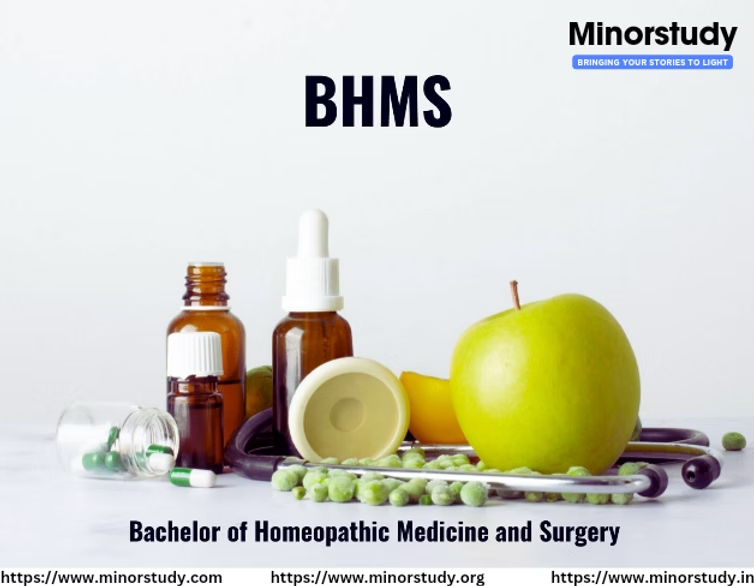Bachelor of Homeopathic Medicine and Surgery (BHMS)
The Bachelor of Homeopathic Medicine and Surgery (BHMS) is an undergraduate degree program that focuses on the study of homeopathic medicine and its practice. Homeopathy is a system of alternative medicine that treats individuals by using highly diluted substances that aim to trigger the body’s natural healing process.
Overview
Key Features | Details |
Full Form | Bachelor of Homeopathic Medicine and Surgery |
Duration | 5.5 years (4.5 years of academic studies + 1 year of internship) |
Eligibility | 10+2 in Science (Physics, Chemistry, and Biology) with a minimum required percentage. |
Regulatory Body | Central Council of Homeopathy (CCH) |
Focus | Homeopathic principles, diagnosis, remedies, surgery, anatomy, pathology, and medical practice. |
Core Principles of Homeopathy
Law of Similars: Homeopathy is based on the principle that “like cures like.” A substance that causes symptoms in a healthy person can cure those same symptoms in a sick person.
Minimal Dosage: Homeopathic remedies are used in very small doses to stimulate the body’s own healing abilities.
Individualization: Homeopathic treatment is tailored to the individual based on their overall health, emotional state, and lifestyle, rather than just the disease.
Curriculum and Subjects
Year | Subjects |
Year 1 | Anatomy, Physiology, Biochemistry, Organon of Medicine, Homeopathic Materia Medica |
Year 2 | Pathology, Microbiology, Homeopathic Therapeutics, Homeopathic Pharmacy, Materia Medica |
Year 3 | Surgery, Homeopathic Diagnosis, Medical Jurisprudence, Homeopathic Clinical Practice |
Year 4 | Practice of Medicine, Surgery, Pediatrics, Psychiatry, Gynaecology and Obstetrics |
Internship | Practical training in hospitals and clinics with homeopathic doctors |
Key Subjects in BHMS
Subject | Description |
Organon of Medicine | The foundational principles and philosophy of homeopathy, including the law of similars. |
Materia Medica | The study of homeopathic medicines, their uses, and effects on the human body. |
Homeopathic Pharmacy | Preparation, dispensation, and standardization of homeopathic medicines. |
Practice of Medicine | Diagnosis, treatment, and management of common diseases using homeopathic remedies. |
Surgery | Surgery principles and practice, focusing on the surgical needs of patients in a homeopathic setup. |
Homeopathic Therapeutics | Application of homeopathic remedies for treating different diseases. |
Career Opportunities
Role | Description |
Homeopathic Doctor | Practices homeopathy to treat and cure various diseases. |
Researcher | Conducts research to prove and improve homeopathic treatments. |
Homeopathic Pharmacist | Prepares and dispenses homeopathic medicines. |
Lecturer/Professor | Teaches homeopathic medicine in colleges and universities. |
Consultant | Provides consultation in hospitals, clinics, or private practice. |
Significance of BHMS
Holistic Healthcare: Focuses on treating the whole person rather than just the symptoms.
Alternative Medicine: Provides an alternative to conventional medicine, particularly for chronic and lifestyle diseases.
Natural Remedies: Uses natural substances to treat ailments, avoiding harsh chemical treatments.
Increasing Popularity: Rising global interest in natural, sustainable, and non-invasive treatment options.
Advantages of BHMS
Offers a non-invasive and side-effect-free approach to treatment.
Integrates well with conventional medicine for holistic treatment.
Provides significant career opportunities in private practice, education, and research.
Conclusion
The Bachelor of Homeopathic Medicine and Surgery (BHMS) provides a comprehensive understanding of the principles and practice of homeopathy. With increasing awareness about alternative medicine, BHMS graduates are equipped to offer effective, natural, and individualized treatments for various health conditions, contributing significantly to the medical community.








